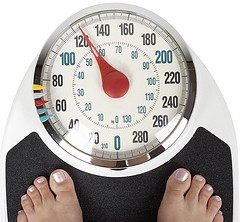
 We all know that cancer treatments and their side effects can ruin the appetite and cause weight loss. What a recent statistic tells us is that severe malnutrition and weight loss can play a part in cancer deaths-at least one in five. In other words, those patients who fail to get help dealing with their nutritional needs are more likely to experience a higher risk of death.
We all know that cancer treatments and their side effects can ruin the appetite and cause weight loss. What a recent statistic tells us is that severe malnutrition and weight loss can play a part in cancer deaths-at least one in five. In other words, those patients who fail to get help dealing with their nutritional needs are more likely to experience a higher risk of death.
According to Patrick Quillin, PhD, RD, CNS, and author of Immunopower, 40% or more of cancer patients die of malnutrition, not from the cancer. The problem starts with the cancer cells themselves, which steal nutrients from healthy cells. Second, nausea, vomiting, and diarrhea-whether caused by treatment or the cancer-remove nutrition from the body and deter appetite. Other side effects like mouth sores, metal taste, and difficulty swallowing also discourage eating. Third, the digestive tract-normally a strong player in absorbing nutrients for the body-is damaged by chemotherapy. Three strikes and the patient badly needs nutrition therapy! Unfortunately, it’s one of the things doctors often miss. According to Lauran Neergaard, AP medical writer, nutrition too often is an afterthought until someone is already in trouble. A 2002 report from the Royal College of Physicians agrees: “…many doctors neglect clinical nutrition through lack of awareness of its potential benefits.”
Studies that reveal the dangers of malnutrition in cancer are popping up everywhere. Science News reported in March of this year (2009) that almost half of all patients with cancer of the voicebox (larynx) who receive radiotherapy treatment will experience malnutrition. Another recent study showed that patients who are malnourished experience greater levels of psychological distress. A supplement published in the European Journal of Oncology Nursing brings together a collection of papers discussing nutrition in cancer, and recommends “proactive nutritional interventions” as part of cancer therapy. Jacqueline Languis, from the department of nutrition and dietetics at VU University Medical Center in Amsterdam, says, “Malnutrition is an underestimated problem….”
On the other side of the coin, studies have shown over and over again that high doses of nutrients can improve the outcome of cancer treatments-cutting tumor recurrence in half in one study on bladder cancer, for example. Fortunately, doctors and hospitals are starting to pay attention. Many hospitals are hiring gourmet chefs, more oncology departments have dietitians on staff, and the American Cancer Society is offering free individualized nutrition counseling through a Dietician On Call service. The best solution, though, according to the American Cancer Society and the National Cancer Institute, is to enlist the help of your own registered dietician, immediately at diagnosis. Surveys suggest that just a third of patients have access to cancer nutritionists, so patients need to become more aware, and demand the help they need.
“Patients who are well-nourished as they’re going through treatment have shorter hospital stays, [and] are better able to tolerate treatment,” says Colleen Doyle, nutrition chief at the American Cancer Society.
In other words, you can research on your own, and try to eat healthier, but you need professional advice and monitoring. Healthy eating for cancer patients can be entirely different from what you’re used to. For example, typical suggestions include eating lots of fruits, vegetables, and whole-grains, with a moderate amount of meat and dairy. However, according to the National Cancer Institute, nutrition recommendations for cancer patients may focus on high-calorie foods that emphasize protein, perhaps more dairy products and cooked eggs, even fewer high-fiber foods, since they can aggravate diarrhea or sore mouth. Every case is different, and every patient is different, so be sure to consult with a professional.
(One option to try: Sable’s Foods Bars. These are the only brand of bars developed to address the three most common complaints of cancer patients: nutrition, taste, and texture. Sable was approved by many cancer patients in focus groups.)
To find a registered dietitian in your area, ask your doctor or nurse, or try the dietitian search at EatRight.com.
Have you experienced malnutrition? Did you get help from a dietitian? Tell us about it!
Photo courtesy of Jessica.Garner77, via Flickr.com.

